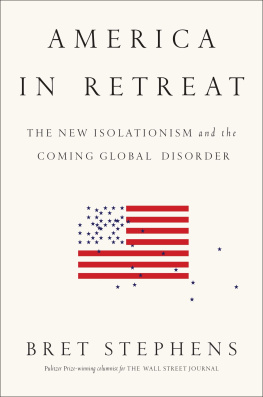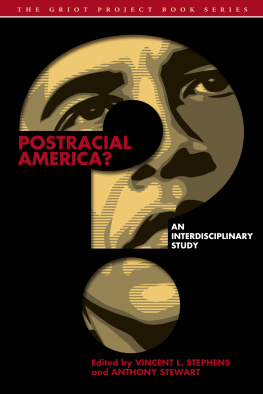USA | Canada | UK | Ireland | Australia | New Zealand | India | South Africa | China
Penguin supports copyright. Copyright fuels creativity, encourages diverse voices, promotes free speech, and creates a vibrant culture. Thank you for buying an authorized edition of this book and for complying with copyright laws by not reproducing, scanning, or distributing any part of it in any form without permission. You are supporting writers and allowing Penguin to continue to publish books for every reader.
For Charles J. Stephens
The price of greatness is responsibility. If the people of the United States had continued in a mediocre station, struggling with the wilderness, absorbed in their own affairs, and a factor of no consequence in the movement of the world, they might have remained forgotten and undisturbed beyond their protecting oceans: but one cannot rise to be in many ways the leading community in the civilized world without being involved in its problems, without being convulsed by its agonies and inspired by its causes.
INTRODUCTION

The Worlds Policeman
I n the nearly nine years that I have been the foreign affairs columnist for The Wall Street Journal, I have received tens of thousands of letters from readers, many of them warm, a few of them rude, others critical or constructive. I publish my e-mail address, bstephens@wsj.com, at the foot of my column, read every note, and try to answer as many of my readers as I can. But there are times when a letter deserves a more extended reply than I have time for in the course of an ordinary workday. One reader, responding to a March 2014 column advocating a muscular U.S. stance against Russias seizure of the Crimean peninsula, wrote me just such a letter.
In response to your editorial today, please repeat after me: We should not be the worlds policeman. Repeat again. And again. Apparently, you just do not get it that an overwhelming majority of Americans would agree with this declaration. Unfortunately, you do not. So, given that, I encourage you to form your own volunteer army to police the hotspots around the globe. Please do not remit any bills to the U.S. government.
Barack Obama agrees with my reader. We should not be the worlds policeman, he told Americans in September 2013. So does Rand Paul: Americas mission should always be to keep the peace, not police the world, the Kentucky Republican told an audience of veterans earlier that year.
This book is my answer to that argument.
In formulating the answer, its important to acknowledge that the wish not to be the worlds policeman runs deep in the American psyche. For wee must Consider that wee shall be as a Citty upon a Hill, the eies of all people are uppon us, John Winthrop warned his fellow Massachusetts Bay colonists in 1630 as they were aboard the Arbella on their way to the New World,
soe that if wee shall deale falsely with our god in this worke wee have undertaken and soe cause him to withdrawe his present help from us, wee shall be made a story and a byword through the world, wee shall open the mouthes of enemies to speake evill of the wayes of god and all professours for Gods sake; wee shall shame the faces of many of gods worthy servants, and cause theire prayers to be turned into Cursses upon us till wee be consumed out of the good land whether wee are going....
Though the phrase city upon a hill is taken from Jesuss Sermon on the Mount (A city that is set on a hill cannot be hid), Winthrops admonition is pure Old Testament. The Lords blessing depends not on our worldly striving but on our moral performance. The fate of the enterprise rests on the virtue of its people. A bad reputation in the opinion of mankind can be fatal. The great task for Americans is to be supremely mindful of our business, not of someone elses. Our security as well as our salvation lie in the proper care of our souls, not the acquisition or exercise of power.
To study American history is to understand that Winthrops admonition has been honored mainly in the breach. The citizens of a city upon a hill may be in the eies of all people. But those citizens, in turn, will be able to see far over the surrounding lowlands. At a glance, they will see rich plains stretching in every direction. They will seek dominion over those plains and their scattered inhabitants, whether through purchase and treaties or confiscation and war. Beyond the plain they will find oceans to harvest and traverse. They will meet enemies on the seas, and to defeat those enemies they will build a navy. In faraway ports they will find wealth and wonders but also double-dealing and cruelty, arousing their appetite and greedbut also their conscience and charity.
And in mixing with the world they will become part of the world. Yet they shall still think of themselves as a city upon a hill.
So it is that Americas encounter with the world has always been stamped with ambivalence about the nature, and even the necessity, of that encounter. It is an ambivalence that has often been overcomebecause the temptation was too great, as it was with the war with Mexico, or because the danger was too great, as it was during the Cold War. But the ambivalence has never been erased. Nearly 240 years after our birth, we Americans havent quite made up our minds about what we think of the rest of the world. Every now and then, were tempted to return to our imaginary city, raise the gate, and leave others to their devices.
It says something about the politics of our time that I have no idea whether the reader who wrote me that letter is a Republican or a Democrat, a Tea Party activist or a lifelong subscriber to Mother Jones. This is new. Until recently, the view that we should not be the worlds policeman was held mainly on the political left. Yes, the view also found a home on the fringes of the right, particularly among small-government libertarians and latter-day Father Coughlins such as Pat Buchanan. But it was typically the left that wanted America out: out of Southeast Asia, Central America, the Middle East, even Europe. And it was usually the left that made the case for a reduced role for the United States in global politics and for a radical rebalancing of spending priorities from guns to butter.
The case for America Out is still common on the left. But now its being made from within the mainstream of the conservative movement. Many things account for this change, including the deep mistrust, sometimes slipping to paranoia, of the Obama administrations foreign policy aims. Many conservatives have also conceded the argument that the wars they once ardently supported in Iraq and Afghanistan were historic mistakes, and that imbroglios in Central Asia, Eastern Europe, or the South China Sea are other peoples problems, best kept at arms length.
The upshot is that there is a new foreign policy divide in the United States cutting across traditional partisan and ideological divides. Its no longer a story of (mostly) Republican hawks versus (mostly) Democratic doves. Now its an argument between neoisolationists and internationalists: between those who think the United States is badly overextended in the world and needs to be doing a lot less of everythingboth for its own and the rest of the worlds goodand those who believe in Pax Americana, a world in which the economic, diplomatic, and military might of the United States provides the global buffer between civilization and barbarism.

















